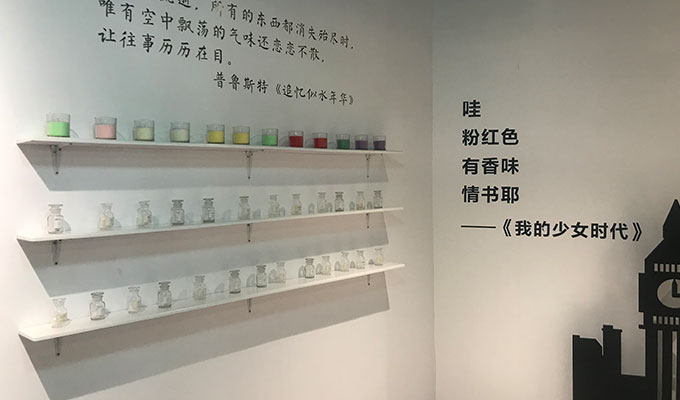The smell of an apple pie down on the street wafts through the air. Suddenly, the memory that your mum cooked in the kitchen after your school finished surges into your head. Or maybe it’s a whiff of a humid wind together with fresh grass that takes you back to a sunny spring trip.
All our senses are connected to memories, though, odor in particular can bring us a rich flurry of memories from a long time ago, and their accompanying emotions.
When people consciously attempt to remember something, they focus on the senses’ details, says Dr. Ron Devere, director of the Taste and Smell Disorders Clinic, odor being the most efficient one.
Such a magical assertion made me want to explore my lost memories. Therefore, I ended up in the Museum of Odor in Nanjing’s Jin’ao shopping mall, beginning my journey through the recollection of smell.
At first look, a big “瓘”character (smell) is seen hanging on the wall. As explained by the museum’s curator, odor does not have any shape, so imagination is key to help you feel it; magical that, when you focus on the smell, without other distractions, your imagination will always drag you into the past.
Herein, the exhibition is split by theme; normal odors that exist in daily life, but there are also the more abstract, named after a city or even a piece of classical music.
I first picked up that labelled “Baby Powder”. Once opened, I had this feeling that the white powder from Johnson & Johnson will puff all over my face. This is it. This is what I used when I was a little child after a shower in the summer. I enjoyed my mother putting the talcum powder all over my belly, giggling and rolling around when I got itchy. This baby powder is that which I miss most from my childhood, when I still had a physical bond with my parents. Now, it is harder and harder to connect with them; even a hug is rare for a Chinese family.
The scent of “crayon” could hardly be considered pleasant, but the pungent and symbolic odor somehow becomes the incentive for primary students to attend school, or at least for me. Thinking of reciting one poem a day or calculating how many hours it will take for the tap to fill the sink while the water still goes down the drain are definitely huge pressures for a 10-year-old girl, but all we enjoyed the art classes that most teachers reckoned unnecessary. I still remember when we were told to imitate international football fans by drawing flags on our face using crayon. I painted the red Chinese flag over my eyes, taking inspiration from pandas. It impressed my teacher.
“Dust”, as the name suggests, is that musty smell of old furniture and fabric. It reminds me of when my grandpa dusted the sewing machine; the dust rising into the air visible in the light of dusk. This is a relaxing smell that also provides for feelings of safety.
The smell makes you feel relaxed and safe, taking me back to an afternoon 10 years ago, when my mum tried to sew a pair of new sleeve protectors for me. I would try every means to distract her from making it, as that old-school stuff was the last thing I want to wear in front of my classmates. However, smart housewives figured they can prevent children from getting their new and light-coloured clothes dirty. Even now, I still see some students dressed as their parents decree; sleeve protectors retaining their priority in mothers’ minds. Few sewing machines can be found in families today.
A woman can be read by her scent; the odor “Dan” represents the leading female role in opera and is found in this collection of Beijing opera’s five character categories, namely “Sheng” (), “Dan” (뎀), “Jing” (씐), “Mo” (칫) and “Chou” (농). Yang Guifei in “The Drunken Concubine”, Yu Ji in “Farewell my Concubine” and the legend Mulan are the most representative Dan characters. This odor of white tea is inhaled in the beginning, sweet and light, then becoming a little bitter, just as in the life journey of an elegant lady; the slightly astringent odor being the sediment of time and experience, with a bitter interlude, with the sweetness returning when they finally grow mature.
Now I do understand the joy of Lieutenant Colonel Frank Slade in “Scent of a Woman”, picturing different people and scenery according to various smells, travelling back in time.
Donald Laird, Director of Psychology Laboratory, Colgate University, New York, researched the connection between autobiographical memory and odor. One of the participants therein said, “When you see something, it also helps you to recall some facts, but they would soon become vague and invisible memories. However, the memory triggered by smell is unavoidable, I did not make any effort to recall it. It seems not merely a memory, but, me turning back to that world, becoming the me from that moment”.
Meanwhile, Dr. Ken Heilman, James E. Rooks Jr. Distinguished Professor Neurology and Health Psychology at the University of Florida, has commented, “Smell goes into the emotional parts of the brain and the memory parts, whereas words go into thinking parts of the brain”.
Smell can be more powerful than words sometimes, certainly in terms of memory, like riding in a time machine with smell as the key in the ignition. We may forget another’s promise, but smell will promise to take us back to that moment.
Source: My Smelly Memories; Nanjing Museum Exhibits the Persuasive Sense | The Nanjinger













